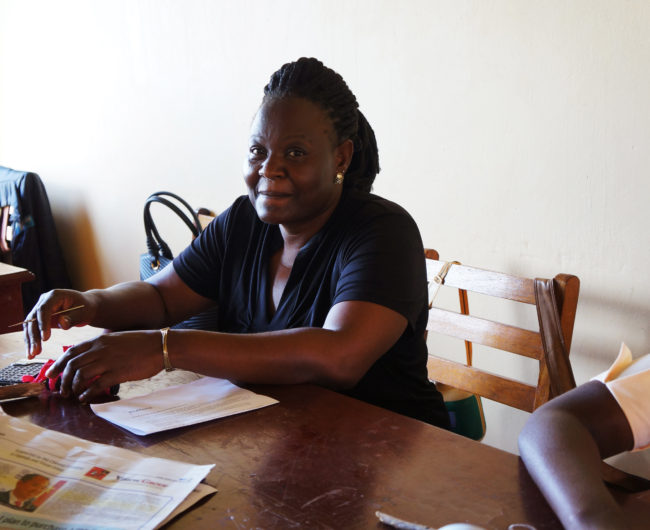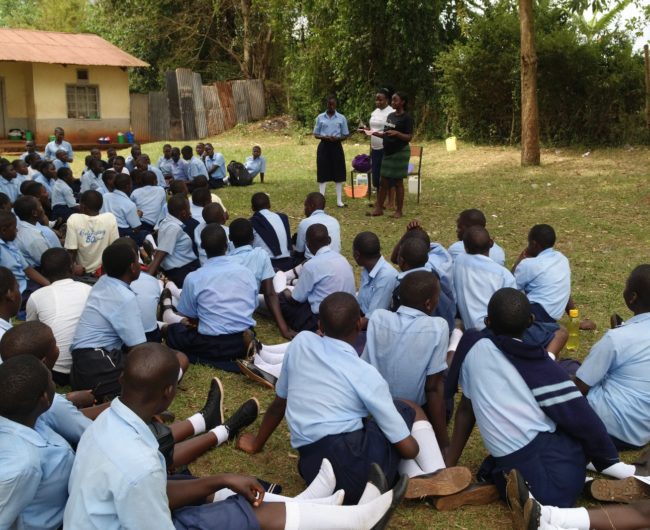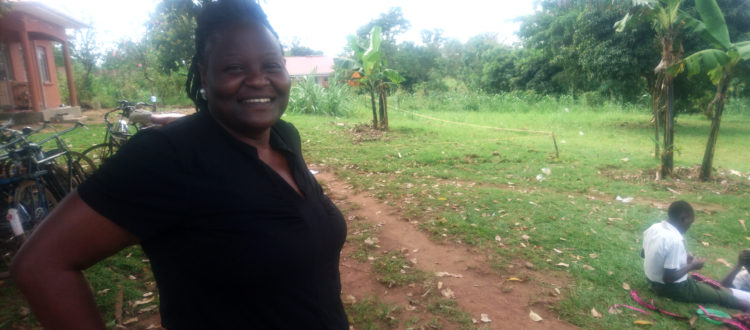“I said to myself: Am I normal?”
Read the story of how Resty – one of the teachers taking part in WoMena Uganda’s project in Buikwe District – experienced having her first period, as well as her thoughts on how important openness and support on menstrual issues are for young girls.
I had taken some good time yearning for it. I was in class, I felt it. I was like, what happened? I had to rush to the loo, and when I got there I saw the blood, and I was very happy, extremely happy.
Resty laughs and her face lights up at the memory of the day she had her period for the first time. Now an adult and sitting in the yard of the school where she is a teacher, she seems to vividly remember that day in class. Even though it came suddenly, it wasn’t a complete surprise: Being 15 years old, she had not only anticipated it but waited impatiently. In fact, she had started to worry that something was wrong with her: “Really, I said to myself, am I normal? I saw all my friends get their periods, and heard the teacher talk about it. People say 9 years, 10 years, and there I was, 15 years old not having had my period.” For some time she had been putting pads on her father’s shopping list; in order to be prepared and perhaps also in an attempt to manifest her menstruation into reality. But until then, nothing had happened and each time she had ended up handing the pads out to girls in school.

This distribution of menstrual products would turn out to be a preview of her current work as a teacher in a secondary school. Besides teaching and all the other tasks related to the job, she helps her students with issues surrounding their menstruation. She has also been one of the teachers involved in WoMena Uganda’s project in Buikwe District, which has the objective of assessing the acceptability of introducing a comprehensive menstrual health training programme as well as menstrual cups and reusable pads as a menstrual health management method. The project is funded by the Embassy of Iceland through the Icelandic International Development Agency and implemented through Buikwe District Local Government. More than 1300 students from four secondary schools have been trained and given reusable pads and a menstrual cup. The project is currently in the process of being evaluated and the lessons learned from this will be implemented when the project is scaled up to students in the upper classes of 28 primary schools next year. The goal of the scale-up is to create a positive environment towards menstrual health among the local communities and for the district to have the capacity to scale up and manage the intervention themselves going forward.

A group of girls are seated nearby, making baskets out of banana leaves, as Resty recounts how her younger self went home that day and even though she felt like celebrating, she dared not tell her strict stepmother about it. Instead, she discreetly told her father who made sure she got pads and – almost equally important – moral support. The following month she got her period again but this time there was something that dampened her excitement. Both before and during it, she suffered from intense menstrual pain, something that is also a problem for many of her students. This pain returned whenever she had her period until one day, a woman in her village made her a special brew that removed it completely and for good. But not all girls are as lucky as Resty when it comes to pain management and parental support. Unfortunately, the village woman took her recipe with her to the grave, but she insists that the latter can be addressed, and that reaching a higher level of understanding of menstruation is an achievable and highly important goal. She says that what is needed is more sensitisation of the parents. Her passion about the issue is underlined by the way she leans forward in her seat when she says:
“Some of the girls are not open to their parents – why? The parents are rude and they are not open to their children. We need to sensitise the parents about the girl child, what she must go through as well as their responsibility as parents. We need to be open and free with the children. My father was very good to me. But what if I wasn’t informed and supported? What if I had not seen, if I had not heard what to do? Who would have helped me? Nobody.”
She often sees how this lack of openness can result in uneasiness and critical attitudes – towards menstruation in general and especially towards menstrual products that by some are perceived as “modern”, such as reusable pads and the menstrual cup. According to Resty there are, however, also more cynical forces than a lack of sensitisation at work. Only last week she saw a doctor on national TV claiming that reusable pads are bad for girls because they are impossible to clean and will cause infections. She had clearly been paid, Resty says, by a company producing disposable pads to discourage the use of other materials. For her students, the training and menstrual products given as part of the project have only resulted in freedom for the girls:
“It has really helped them. And one day I asked them: Between the two – the cup or the reusable pad? Those ones who were using the cup said they don’t have any problem, “For us, we are free”. And those who were using the reusable pad also had no problems. Both are good.”
That a lack of materials can be a huge barrier in a girl’s life is shown by the cautionary tale Resty tells of a girl she knew growing up. The girl was brought in to Resty’s large, polygamous family but had apparently never been informed that a woman menstruates and blood comes out. So when the time came for her to have her first period, she was confused and scared. She ran home from school and cut out a piece of a mattress and then pushed it inside her to try and absorb the blood. After some time, Resty and some of the other girls were alerted when they heard her cry, and they told her that what was happening with her body was completely normal. But the experience seemed to have made a mark on her; she still isolated herself whenever she had her period:
“She stopped playing with us, she was just ever inside the house. She was fearing. Some kids still do this, they fear and they take whatever they can find that they think can absorb. They don’t know, that is why we need to sensitise everybody – community, society, woman, man, girl and boy. Tell everybody that it is something normal and not a taboo,” she says with so much dedication that she almost gets out of her chair and stands up.
Having teachers like Resty involved in projects and sharing their experiences is vital to WoMena’s work with empowering and educating girls and their communities to see menstruation as a positive event – something that can be handled and talked about openly and freely without shame or fear.
Blog Author: Rasmus Hauge
 Rasmus is part of the communications team and based in WoMena’s Kampala office. He holds an MA in Literature and has worked with communications for different organisations and companies.
Rasmus is part of the communications team and based in WoMena’s Kampala office. He holds an MA in Literature and has worked with communications for different organisations and companies.

